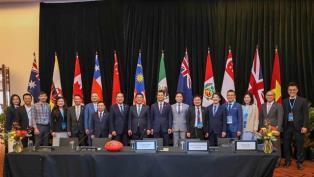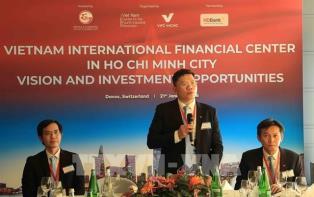The two-day event was organised by the Foreign Trade University (FTU) in collaboration with Social Business Creation of the HEC Montréal, Canada, to foster academic exchange and practical dialogue on the application of digital transformation for sustainable development.

HÀ NỘI — More than 500 local and international speakers discussed the impact digital transformation would have on social well-being and Environmental, Social, Governance (ESG) performance at a conference held in Hà Nội on July 31.
The two-day event was organised by the Foreign Trade University (FTU) in collaboration with Social Business Creation of the HEC Montréal, Canada, to foster academic exchange and practical dialogue on the application of digital transformation for sustainable development.
Opening the event, FTU Vice President Đào Ngọc Tiến highlighted ESG as a critical factor determining the survival, growth, and sustainable value creation of every organisation.
“In a brittle world, only businesses and organisations that genuinely prioritise environmental responsibility, care for social well-being, and build transparent governance can maintain trust, attract resources and navigate crises,” said Tiến.
Tiến said that digital transformation, when correctly oriented, would be more than just a tool for increasing business efficiency. It is the key to building resilience for organisations and communities in an anxious world.
It enables us to collect environmental impact data, optimise sustainable supply chains, enhance governance transparency, and most importantly, create innovative solutions to social problems ranging from education and healthcare to equality.
“If we don't swiftly integrate digital transformation with ESG objectives and social impact, we will miss golden opportunities not only to survive but also thrive in the brittle, anxious, non-linear and incomprehensible era,” said the FTU vice president.
Tiến added that the conference would be a platform to share knowledge and experiences in applying digital transformation to enhance social impact and ESG performance and discuss necessary policies and regulatory frameworks to ensure that technology is used responsibly, reduces fragility, and enhances societal adaptability. It is also a chance to build collaborative networks among researchers, policymakers, businesses and social organisations and foster innovative and sustainable solutions that help us navigate and overcome the challenges of the BANI world.
At the event, participants heard that digital transformation is becoming a crucial driving force for countries and enterprises to effectively implement ESG principles. However, in many emerging economies such as Việt Nam, further in-depth discussion is required to bridge the gap between theory and practice, and between technology and social impact.
At the conference, participants focused the discussion on various aspects of digital transformation aimed at generating positive social impact and enhancing performance in ESG dimensions. A series of high-quality academic workshops will also take place, such as the 'Workshop on Publishing ESG Research: Việt Nam’s Insights, Global Impacts', a training and sharing session focusing on ESG research directions within the Vietnamese context and international trends, especially suitable for early-career researchers.
The conference provided an open and dynamic academic environment that promotes multidimensional dialogue on timely topics such as digital transformation and ESG, key pillars for an adaptive, innovative economy and a sustainable future. — VNS




